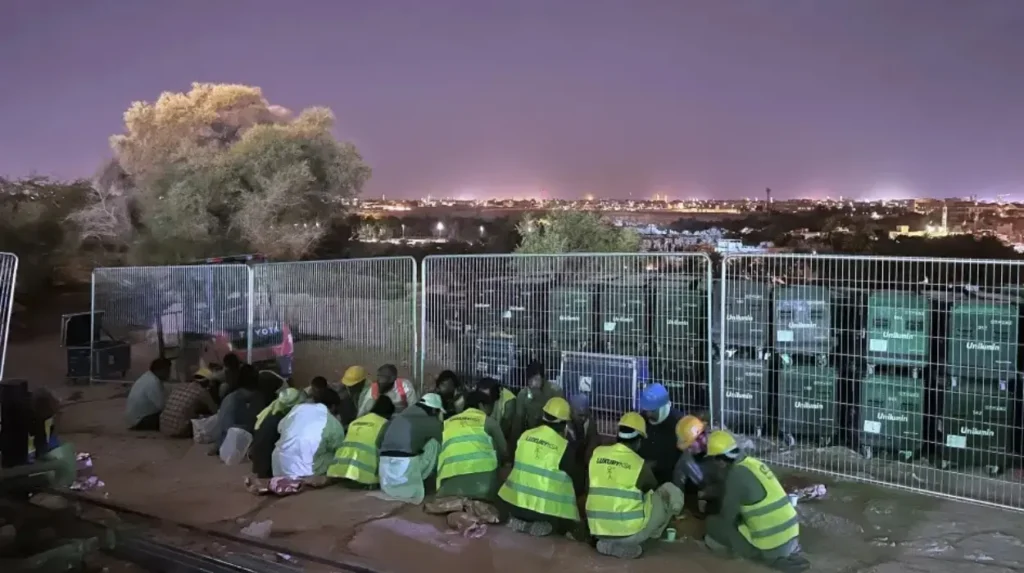The news of Saudi Arabia being granted the hosting rights of the 2034 FIFA World Cup has raised broad public discussion. While supporters point to the investments in sports facilities by the kingdom and its plans to become a world sports center, harsh doubts regarding human rights, regional security, and geopolitical morality cannot be discounted. Recent comments by Prince Turki Al-Faisal, ex-Saudi ambassador and chief of intelligence, highlight why international bodies such as FIFA need to rethink hosting the World Cup in Saudi Arabia.
Regional Security Issues
In September 2025, Prince Turki Al-Faisal delivered a stark warning about Gulf state security. Addressing the Arab News Gala, he highlighted that the Gulf is threatened by what he calls a “pariah state” in the form of Israel, after its aggression against Qatar. The Israeli airstrikes on Hamas commanders while negotiating a ceasefire showed how regional partnerships and security commitments are weak. Prince Turki told Al-Akhbar, “This attack is an eye-opener to question the credibility and reliability of alliances… Israel must not be allowed a free hand.”
This is a threat with larger implications for Saudi Arabia’s capacity to host an international sporting event. A World Cup is a massive logistics and security undertaking involving strong defense against terrorism, civil instability, and geopolitical disruptions. If the security of the kingdom itself is in doubt, can the world trust it to protect thousands of players, officials, and fans from all over the globe? The dangers are real, and hosting the World Cup under such conditions would be irresponsible.
Human Rights Abuse
In addition to security issues, Saudi Arabia’s human rights record in the previous 10 years provides an even stronger argument against a boycott. Human rights groups have continued to report abuses ranging from curbs on freedom of expression, gender-based discrimination, and the systematic suppression of opposition. Amnesty International and Human Rights Watch reports have recorded detention of activists, suppression of media, and the lack of fair trial assurances. Putting on the World Cup in a nation with this type of record constitutes “sportswashing” – when repressive governments try to whitewash their global reputation while continuing to abuse human rights.
The timing is especially concerning in light of Saudi Arabia’s current military engagement in Yemen, which has seen thousands of civilians killed in the midst of a humanitarian crisis. The kingdom’s activities in the area, combined with recent warnings from Prince Turki regarding security concerns, signal a government more concerned with projecting power than with maintaining global standards for safety and human dignity. Granting Saudi Arabia the right to host an international sporting event could inadvertently legitimize or normalize such practices.
Exploitation of Migrant Laborers
The other key issue that cannot be overlooked is the exploitation of migrant laborers in Saudi Arabia. The build-up for major events, such as sports competitions, tends to be dependent on foreign workers under demanding and at times abusive labor conditions. Investigations have indicated that in 2024 and 2025 there were substandard living conditions, unpaid wages, and hazardous working conditions for migrant workers constructing infrastructure projects like sports stadiums, hotels, and transport networks. Awarding the World Cup to a country where workers’ rights are routinely violated sends a dangerous message about FIFA’s priorities, suggesting that labor exploitation is acceptable if it supports commercial interests.
The Role of International Diplomacy
Prince Turki’s speech also highlighted the broader role of international diplomacy, particularly regarding the Israeli-Palestinian conflict. He faulted the United States for relinquishing its role of an honest broker and for being an automatic supporter of Israel, contributing to regional instability. Although these geopolitical questions may appear divorced from sports, they are very much intertwined. FIFA, being a global institution, cannot turn a blind eye to the fact that its decision-making takes place in a complicated set of international relations. Holding the World Cup in Saudi Arabia may be seen as giving tacit endorsement to the kingdom’s alliances and political positions, which further distance millions of fans who are against these policies.
Public Opinion and Global Outcry
There is increasing international discontent and public outrage at Saudi Arabia hosting major sporting events. Social media campaigns, protests, and appeals from human rights groups have urged a boycott. The contention is straightforward: the World Cup is not merely a football competition—it is a platform to demonstrate international cooperation, fairness, and respect for human dignity. Any host nation that fails to meet these ideals risks reducing the event to a circus of controversy instead of celebration.
In addition, players and teams now realize the moral issues surrounding the locations where they play. Some top sports personalities have publicly endorsed human rights campaigns, arguing that sport must not be used as a way to distract from serious abuse. By not listening to such voices, FIFA will lose both its viewership and the athletes whose international status lends prestige to the sport.
Prince Turki’s warnings about the instability and security risks in the Gulf further reinforce this point. Hosting a mega-event in a region facing political and military threats could put millions of visitors at risk. Ensuring safety must be a non-negotiable criterion in any hosting decision.
A Call for Accountability
Against the backdrop of these problems—regional security concerns, human rights violations, abuse of migrant workers, and morals—granting the 2034 FIFA World Cup to Saudi Arabia is a serious error. Prince Turki Al-Faisal’s recent admonitions are a grim reminder that the security of the Gulf is precarious, and a nation with internal and external political problems may not be ready to host the sporting event dearest to the world’s hearts in a secure and dignified manner.
Global bodies such as FIFA have the mandate to ensure the integrity of football and the welfare of all stakeholders involved in the tournament. These stakeholders include players, fans, media personnel, and host communities. Granting the World Cup to Saudi Arabia forsakes such obligations and threatens to convert a unifying global spectacle into an event of controversy and division.

